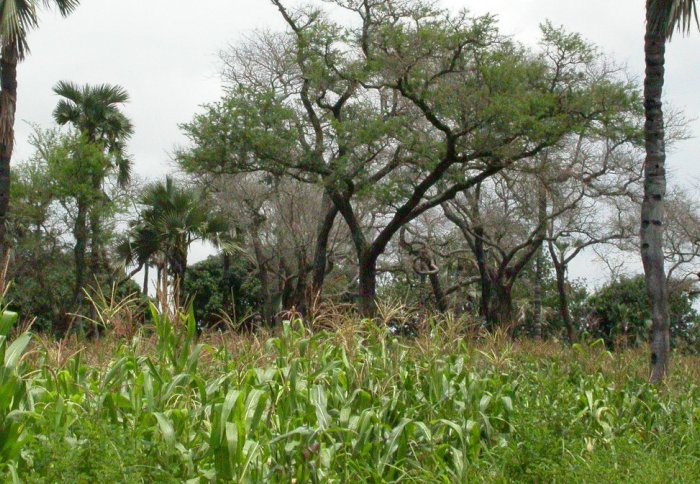Report lays out how farmers in Africa hold key to growing more with less impact
by Simon Levey

Agroforestry scheme in Burkina Faso using the tree Faidherbia albida to increase the yield of maize growing below (c) Marco Schmidt
African smallholder farmers can increase food production and reduce poverty without harming the environment, says a new briefing paper launched today.
Smallholder farmers in sub-Saharan Africa make up the majority of the world's non-industrial food producers. However over 200 million of those living on the continent are chronically hungry and 40 per cent of children under the age of five have stunted growth thanks to malnutrition.
Over the past forty years agricultural production in the continent barely increased while population has been growing rapidly and shows little sign of tailing off. At present, African growers are only expected to be able to meet 13 per cent of the continent’s food needs by 2050.
The new paper calls on governments around the world to tackle this food shortfall, alongside scarcities in such things as fertile soil, water and other natural resources. 'Sustainable Intensification' now moves away from past schemes of financial and agricultural aid.
Overall this strategy aims to increase incomes for local food producers, protect irreplaceable natural resources, and produce crops in way that is resilient to future environmental changes.
'Sustainable Intensification: A New Paradigm for African Agriculture' was launched yesterday at a special event in the UK's Houses of Parliament. It's authors are a group of 12 international experts from the fields of agriculture, sustainable development, trade, policy, and global development, known as the Montpellier Panel. They are chaired by Sir Gordon Conway, Professor of International Development and Director of Agriculture for Impact at Imperial College London.
"A solution that has been proposed to address Africa’s challenging food supply issues is sustainable intensification. Recently this term has been incorrectly associated only with high-input, industrial agriculture, and has become highly contentious among politicians and academics alike," said Professor Conway.
"But as we strive to feed a population expected to reach nine billion by 2050 sustainably, we must bring it back to the term's scientific value and its potential relevance to all types of agricultural systems, including for smallholder farmers in Africa."
The paper details ecological, technical and socio-economic solutions to Africa's worrying rates of hunger, malnutrition and poverty.
On the ground
Far from radical ideas, successful local and small-scale examples of sustainable intensification are already in use throughout Africa where they have been devised by local smallholder farmers.
For instance, some 200 million sub-Saharan Africans face serious water shortages. Among them are farmers living on the sun-baked soils of northwest Burkina Faso. Here farmers have pioneered a novel method of conserving water by digging medium-sized holes called zai (or water pockets) in rows across the fields.
During the dry months, each zai fills up with leaves. Farmers add manure, which attracts termites who create an extensive network of underground tunnels beneath the holes and bring up nutrients from the deeper soils. When the rainy season arrives, the zais capture and hold water which the farmers sow with sorghum or millet seed.
The Faidherbia tree curiously sheds its leaves in the wet season, they turn to a nutritious compost on the wet ground providing a natural fertiliser to crops planted underneath while allowing for sunlight to pass through during the growing season.
– Professor Sir Gordon Conway
Chair of the Montpellier Panel
The paper calls for international schemes to increase the reach of these ecological, technological and socio-economic approaches. Farmers consistently reported greatly increased yields using the zai technique and the idea has been spread by a scheme whereby the farmers educate one another.
In another approach farmers have increased the quantity of maize production by planting their fields with a native African tree called Faidherbia albida.
Professor Conway explains, "The Faidherbia tree curiously sheds its leaves in the wet season, they turn to a nutritious compost on the wet ground providing a natural fertiliser to crops planted underneath while allowing for sunlight to pass through during the growing season.
"Maize yields are boosted while decomposition of the tree's dropped leaves actually captures carbon and buries it in the soil. This kind of win-win example encompasses the main ideals of sustainable intensification."
Making it happen
"Technological measures such as Faidherbia, other agroecological approaches and various forms of crop and livestock breeding are only part of the answer," Professor Conway writes in the Huffington Post.
"In particular, farmers must have access to fair and efficient markets and be part of remunerative value chains. Farmers' cooperative associations can assist smallholder producers in marketing their products and receiving higher prices by helping to centralize access to credit and stocks, offering better quality of storage facilities and increasing farmers’ bargaining power when selling surplus crops.
"Relevant to all forms of Sustainable Intensification is science and innovation, which not only allows advances to be scaled up and out more widely, but from which new technologies to tackle novel, unpredictable and growing global challenges such as climate change will come. Support for research, development and education from the local to global level is also a must."
Header image credit: Marco Schmidt, West African Plants Database, Wikimedia Commons, CC-BY-SA 2.5
Article text (excluding photos or graphics) © Imperial College London.
Photos and graphics subject to third party copyright used with permission or © Imperial College London.
Reporter
Simon Levey
Communications Division